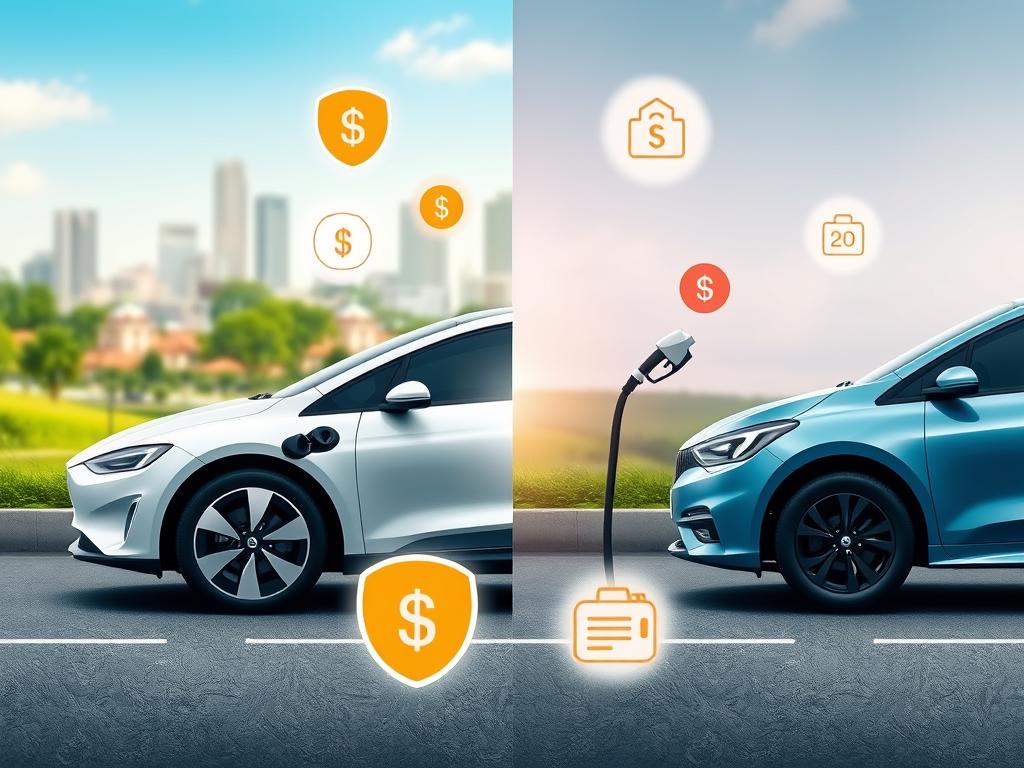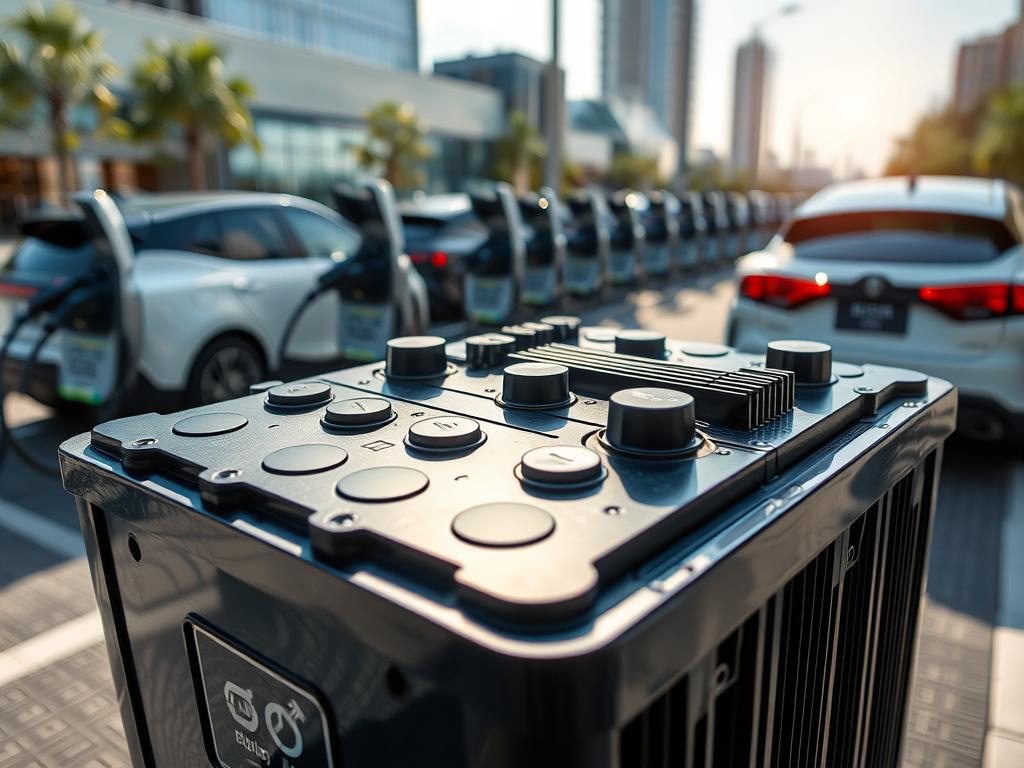In recent years, the shift toward electric vehicles (EVs) has gained considerable momentum, driven by rising concerns over climate change and a growing demand for sustainable transportation options. As consumers increasingly embrace renewable energy vehicles, questions surrounding their insurance rates compared to traditional cars have emerged. Understanding the nuances of electric vehicle insurance, including considerations for plug-in hybrid assurance and the specific nuances of plug-in hybrid insurance, is essential for prospective EV owners. In this article, we will explore how insurance rates for electric vehicles stack up against those for conventional cars, and what factors might influence these costs in this evolving automotive landscape.
Electric vehicles (EVs) are becoming more popular, and we’re looking into their insurance costs. Insuring an electric car usually costs about 20% more than a traditional car. This means you might pay around $337 each month, or $4,043 a year.
This higher cost is mainly because EVs are pricier to buy and fix. But, the difference in insurance costs between EVs and traditional cars is getting smaller. As EV prices drop and repair options grow, insurance costs are getting closer to each other.
The Volkswagen ID.4 is now the cheapest EV to insure, with rates starting at $241 a month. On the other end, the Tesla Model X is the priciest, costing $522 a month.
Key Takeaways
- EV insurance costs around 20% more than traditional gas-powered vehicle insurance on average.
- The average monthly premium for electric car insurance is $337, or $4,043 annually.
- The Volkswagen ID.4 is the cheapest EV to insure at $241 per month, while the Tesla Model X is the most expensive at $522 per month.
- Insurance rates for EVs made by legacy automakers like Ford and Volkswagen are generally lower than rates for EV-only brands like Tesla and Rivian.
- State Farm offers the most affordable electric vehicle insurance, with rates up to 40% lower than the average.
Understanding the Cost Gap Between EV and Traditional Car Insurance
Electric vehicles (EVs) are becoming more popular. But, they cost more to insure than traditional cars. This is because EVs have higher repair and replacement costs.
Replacing an EV battery can cost between $4,000 and $20,000. Also, there are fewer shops that can fix EVs. This makes repairs more expensive. These reasons lead to higher insurance rates for EVs.
But, as EVs become more common, insurance costs will likely go down. For some models, like the Ford F-150 Lightning, insurance is already similar to or even cheaper than gas cars. This shows that as EVs become more widespread, insurance costs will get closer to those of traditional cars.
| EV Model | Average Annual Insurance Premium | Comparison to National Average |
|---|---|---|
| 2022 Tesla Model S | $3,365 | Nearly double the national average |
| 2022 MINI Electric | $1,389 | 20% lower than the national average |
As the electric vehicle market grows, insurance costs will adjust. The main factors causing the cost gap will change. This will make electric car insurance and green car policy more affordable for zero-emission auto insurance buyers.
The True Cost of Electric Vehicle Insurance
The shift to green cars is picking up speed, and people are curious about EV insurance costs. Electric cars from big names like Tesla and Rivian are fast and eco-friendly. But, their insurance can be pricier than gas cars.
EVs from well-known brands usually cost about $282 a month to insure. But, cars from Tesla and Rivian can cost up to $419 monthly. This big difference is because of the car’s value, repair costs, and parts availability.
| Vehicle Type | Average Monthly Insurance Cost |
|---|---|
| Mainstream EV | $282 |
| EV-only Brands (Tesla, Rivian) | $419 |
| Gas-powered Vehicles | $282 |
Even though EVs might cost more to insure at first, owners can save money on fuel. They might also get tax credits up to $7,500. Plus, many places offer extra savings for green cars.
As more people choose EVs, insurance costs might drop. New tech and more EVs on the road could make green cars cheaper to insure. This could help more people choose eco-friendly cars.
How Battery Replacement Impacts Insurance Premiums
The cost of replacing EV batteries is a big deal in eco-friendly auto policies. EV batteries can cost between $4,000 and $20,000 to replace. This is much more than the $100-$200 for traditional car batteries. This high cost is a key reason why insurance for electric cars is more expensive.
Insurance usually covers battery replacement if it’s damaged in an accident or other covered event. As battery tech gets better and cheaper, we might see lower insurance costs for electric vehicles. But for now, the high upfront costs and special repair needs of EVs mean higher insurance rates than gas cars.
A report by Allianz Commercial found that claims involving lithium-ion batteries have caused losses in different insurance areas. This, along with the need for specialized mechanics and challenges with electric trucks, has led to changes in insurance policies and rates.
Despite these hurdles, the insurance scene for electric vehicles is changing. Companies like Munich Re and Chubb are offering special coverage options for battery-powered cars. As the EV market grows, we’ll likely see more creative solutions for the unique insurance needs of eco-friendly car owners.
Specialized Repair Shops and Their Effect on Insurance Rates
The green vehicle protection and sustainable transportation policies are making electric vehicles (EVs) more popular. But, the lack of specialized repair shops for EVs is raising insurance rates.
There are few places that can fix EVs’ complex electrical systems and expensive lithium-ion batteries. These shops charge more because they need special training and skills.
As more people buy EVs, the number of repair shops will grow. This could make repairs cheaper and lower insurance costs for EV owners.
Some insurance companies are working with EV repair shops to control costs and improve service. They want to make repairs faster, better, and cheaper for EV owners. This way, they can offer lower insurance rates.
The green vehicle protection and sustainable transportation policies are changing how we move. The insurance industry must adapt to the EV market’s challenges. By teaming up with repair shops and using new technology, insurers can offer better, more affordable insurance for EV owners.
Insurance Discounts and Incentives for EV Owners
If you own an electric vehicle (EV), you might be happy to know that many insurance companies offer discounts. These discounts can help lower the cost of insuring your zero-emission vehicle. You could get up to 10% off or even extra coverage for your home charging station.
EVs often cost more to repair because they need special parts and skilled workers. But, big insurers like Geico, Nationwide, State Farm, and USAA give discounts to EV owners. They see the good in zero-emission vehicles.
EV owners can also get federal tax credits and local or state rebates. These can help pay for the higher insurance costs. Plus, bundling your home and auto insurance can save you up to 25%. This makes owning a plug-in hybrid or all-electric vehicle more affordable.
It’s important to think about the extra coverage options for your electric vehicle. Many insurers now offer extra benefits. For example, they might cover your home charging station and portable EV chargers. This ensures you’re protected if something unexpected happens.
As more people choose zero-emission vehicles, insurance for EVs is changing. By looking into discounts and incentives, you can save money. You’ll also enjoy the environmental and financial perks of driving an electric car.
| Insurance Provider | EV Insurance Discount | Additional Benefits |
|---|---|---|
| Geico | Up to 10% | Coverage for home charging stations |
| Nationwide | Up to 10% | Portable EV charger coverage |
| State Farm | Up to 10% | Bundling discounts for home and auto |
| USAA | Up to 10% | Federal tax credits and local/state rebates |
Tesla vs. Traditional Auto Insurance: A Cost Comparison
Electric vehicles (EVs) come with a unique insurance cost. As electric mobility and renewable energy grow, knowing the price gap between Tesla and traditional insurance is key.
The National Association of Insurance Commissioners (NAIC) says EVs are pricier to insure than gas cars. New EVs cost an average of $56,575, while gas cars average at $47,870.
| Vehicle Type | Average Annual Insurance Cost |
|---|---|
| Tesla Model 3 Long Range | $470 more than an Audi A4 2.0T Premium |
| Nissan Leaf | $35 less than a Toyota Prius |
| Chevrolet Bolt EV | $78 more than a Hyundai Ioniq Blue (hybrid) |
EVs cost more to insure due to repair costs and longer repair times. EV repairs are over 45% more expensive than gas car repairs. They also take 15.6 days to fix, compared to 12.7 days for gas cars.
But, there’s hope for EV owners. As more EVs are on the road, insurers will learn more about them. This could lead to lower repair costs and more technicians. Consumer Reports also found EVs have lower maintenance and repair costs over time than gas cars.
Tesla’s insurance program can be cheaper for Tesla owners in some states. But, State Farm offers the lowest EV insurance rates at $201 a month, 40% less than the average. So, it’s important for EV owners to shop around for the best rates.
As electric mobility and renewable energy grow, EV insurance costs are expected to get closer to traditional auto insurance. By understanding the current market and exploring options, EV owners can find the right insurance for their needs.
Major Insurance Providers Offering Electric Vehicle Insurance
More people want eco-friendly auto insurance for electric cars. Big insurance companies are now offering special policies for EV owners. Companies like State Farm and Allstate, plus Tesla Insurance and Lemonade, are expanding their services.
State Farm has one of the lowest monthly rates for EV insurance at $201. Other big names like American Family, Progressive, Geico, Allstate, and Farmers also have EV insurance packages. These packages meet the unique needs of electric car owners.
Specialized EV insurance providers, like Tesla Insurance and Lemonade, offer unique features. They cover home charging stations and towing to charging spots. These features are not always found in traditional auto insurance.
It’s important for EV owners to compare insurance quotes from different providers. This way, they can find the best coverage at the best price. It helps protect their investment in an eco-friendly vehicle.
Strategies to Lower Your EV Insurance Premium
As more people buy electric vehicles (EVs), it’s important to find ways to cut insurance costs. Luckily, there are several methods EV owners can use to lower their premiums. These strategies can help you enjoy green auto insurance savings.
One good way is to raise your deductible. A higher deductible can lower your monthly payments. But, make sure you can afford the deductible if you need to make a claim.
Keeping a clean driving record is another smart move. Insurance companies often give electric vehicle policy discounts to safe drivers. This is because they are less likely to have accidents.
Insuring your home and car with the same company can also save you money. Many insurers offer discounts for bundling policies. This is a smart choice for EV owners.
Some insurers have programs that track your driving. By driving safely, you might get even more discounts. This can help lower your insurance costs.
Lastly, it’s key to shop around and compare insurance quotes. Look for EV-specific discounts and review your policy regularly. This can help you find better rates over time.
By using these strategies, EV owners can find the best insurance deals. This way, they can enjoy the benefits of driving an eco-friendly car without breaking the bank.
| Strategy | Potential Savings |
|---|---|
| Increase Deductible | Up to 15% reduction in premiums |
| Maintain Clean Driving Record | Up to 20% discount |
| Bundle Home and Auto Insurance | Average of 17% savings |
| Usage-Based Insurance Programs | Up to 30% reduction for safe driving |
| Shop and Compare Insurance Quotes | Varies, but can lead to significant savings |
Future Trends in Electric Vehicle Insurance Market
The electric vehicle (EV) industry is changing fast. We’ll see big shifts in EV insurance soon. With more EVs on the road, insurance costs will drop. This is because fixing EVs will get cheaper and parts will be more affordable.
Telematics and usage-based insurance will become key for EVs. Insurers will offer custom coverage based on how you drive. This means better insurance for EV owners.
EVs with advanced driver assistance systems (ADAS) and autonomous features will lead to new insurance models. Insurers are creating special coverage for EVs. This includes protection for charging equipment and battery wear.
As EVs become more common, we’ll see more focus on sustainability and cost-effective repairs. The insurance industry will work together to offer better, more affordable insurance. This will be important for EV owners as autonomous vehicle insurance grows.


